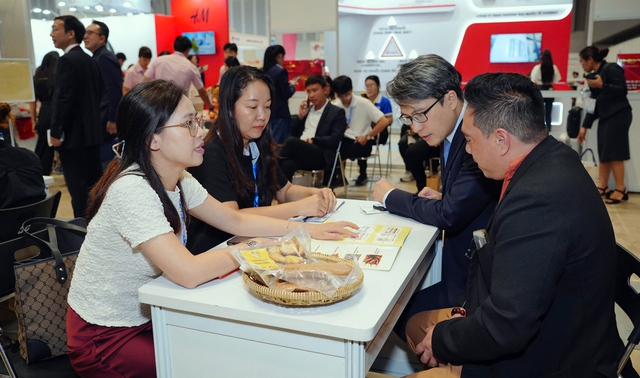
Representatives of a Vietnamese enterprise (L) introduce their products to international buyers at the Vietnam International Sourcing Expo 2025, held in Ho Chi Minh City from September 4 to 6, 2025. Photo: Vietnam International Sourcing Expo 2025
In an interview with Tuoi Tre (Youth) newspaper on the sidelines of the Vietnam International Sourcing Expo 2025, held from September 4 to 6 in Ho Chi Minh City, Dionathan Santos, founder and executive chairman of the Brazil-Vietnam Chamber of Commerce and Industry, said Brazilian consumers are increasingly aware of the quality of Vietnamese products, particularly in agricultural and industrial raw materials.
He added that Vietnam can compete with countries like Indonesia and Thailand in both quality and pricing, and that Vietnamese workers are “younger, skilled, and more flexible than those in Cambodia or the Philippines.”
Santos noted that Brazil sees Vietnam not as a replacement for China but as a complementary supplier, making price and quality decisive factors in negotiations.
At the same time, he highlighted logistical challenges in Vietnam that raise concerns about product transparency.
Compared with China, Vietnamese enterprises remain less competitive in pricing and delivery times, complicating long-term partnerships with large Brazilian buyers, he added.
From the UK, Habib Jan of KAK Private Limited, a distributor of food and beverages, shared plans to import 100 containers of food and beverages from Vietnam next year.
He praised Vietnamese products for their clear advantages in price and quality but stressed that suppliers aiming to enter demanding markets like the UK must provide full certification and transparency regarding product origin.
Jan also noted that while competitive pricing is important, consistent quality is crucial for Vietnam to retain international buyers.
Heidi Tran, representing Mexico’s Coppel Group, echoed similar concerns, commending the quality of Vietnamese factory products while pointing out that inconsistencies in product standards undermine buyer confidence, particularly among major distributors.
Tran also observed that rigid internal processes at some factories can make long-term cooperation difficult if both sides are unable to adapt to each other’s operational standards.
For the Middle East market, Fasuludeen, representing KAMI Food Stuff Trading LLC, a UAE-based distributor of Japanese food, lauded Vietnamese jasmine rice and noted that product quality has steadily improved, earning recognition from international partners.
Nonetheless, he said many Vietnamese suppliers still struggle to connect with buyers and face challenges in communication and after-sales support.
“We have had experiences where transparency, sustainability, and quality consistency were lacking. However, enterprises are gradually improving, which is why we continue to return to Vietnam,” he said.
From an e-commerce perspective, Larry Hu, general manager of Amazon Global Selling Southeast Asia, highlighted a 300-percent increase over the past five years in products exported by Vietnamese sellers through Amazon.
The number of Vietnamese enterprises generating over US$1 million in annual sales has also grown tenfold, with the fastest-growing categories including home and kitchen, health and personal care, apparel, and beauty.
However, to sustain their appeal, products must align with emerging consumer trends, including environmental friendliness, health safety, and user-friendly design.
“Global consumers are increasingly attentive to product origin and sustainability, so businesses need to clearly communicate the story behind their products,” Hu added.


Max: 1500 characters
There are no comments yet. Be the first to comment.